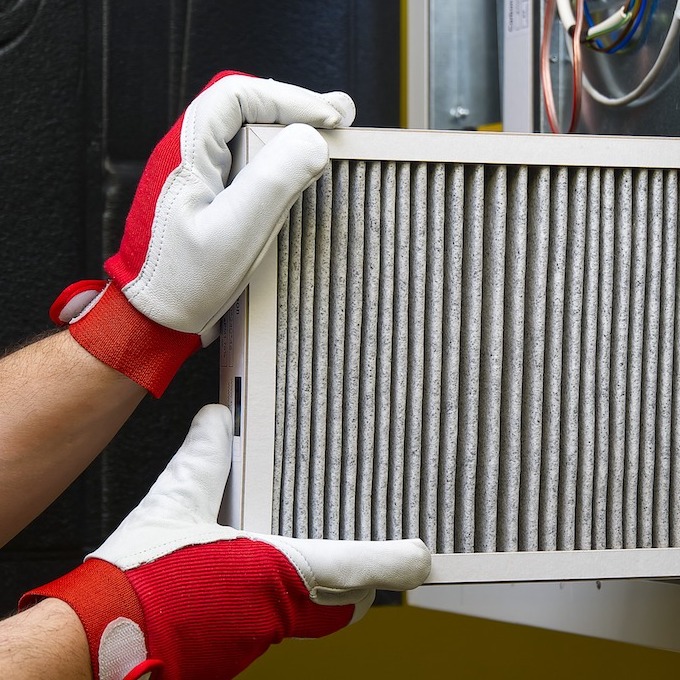
Why Are Air Filtration Systems Important?
Maybe it’s a family member or an employee, or maybe it is you, with constant stuffy nasal and constant throat tickling cough. Regardless of who has the problems, it has been recommended to have an air filtration system installed.
What Exactly is an Air Filtration System and How Does it Improve Indoor Air Quality?
An air filtration system is a device that removes contaminants and pollutants from the air, by capturing the harmful particles and trapping them in the filter. What types of contaminants and pollutants are removed by an air filtration system? There is some debate that an air filtration system isn’t as beneficial as they are advertised, but again, there has been proof that using 2 stand-alone systems removed up to 60% of simulated SARS-CoV-2 aerosols in an enclosed environment.
While that may not be 100%, that is 60% fewer contaminants in the air that you, your family, customers, and employees are breathing. An air filtration system target contaminants and pollutants such as:
- Bacteria
- Dust and Pet dander
- Mold, Pollen, and Viruses
- Smoke
- VOCs (Volatile Organic Compounds)
By grading an air filtration system with activated carbon filters, the odors caused by pets and VOCs are removed, giving your home a clean, fresh, smell.
What is the Most Effective Type of Air Filtration System?
Today, there are more bacteria and more viruses floating around for us to breathe in, thus the increased interest in air filtration systems. So, do you get the most expensive one you can afford? Not necessarily! The Proton Pure isn’t the most expensive but had the highest approval rating and offers these features:
- Kill over 99% Of Bacteria and Viruses
- Removes Bad Odors
- Eliminate Dust and Captures Pet Dander & Pollen
- True HEPA Filter and has an Ultra-Quiet Operation
- Ultra-Compact and Portable
How Often Should Air Filters Be Changed?
Manufacturers generally recommend changing an air filtration system filter every three months. This schedule may need to be more frequent if you live in a dry and dusty environment or if you have several pets. Upping this schedule every two months may be better for you. If you’re out of town for an extended time, changing the filter every 9 to 12 months is sufficient.
What Happens if the Air Filter Isn’t Changed?
An air filtration system isn’t designed to filter the air endlessly. Like your HVAC system, you need to set up a schedule to routinely changed the filter. What happens if you don’t?
- It won’t filter the air as intended.
- Contaminants and dust get into the HVAC system and jam the moving parts.
- The airflow is restricted, further straining the air filtration system.
- The air filtration system and HVAC system use more power, i.e., more electricity
- The contaminants collected in the system will remain and work back into the air.
What Size Air Filters Should Be Used?
Each air filtration system will come with an owner’s manual that will provide the size and type of air filter replacements to use. There isn’t any one-size-fits-all.
Are Air Filtration Systems Noisy?
The brand and quality will have an impact on the level of noise emitted from an air filtration system. However, they must remain within the decibel threshold set by the CDC. For most homeowners, it becomes ‘white noise’ that blends in with the rest of the household. For others, it becomes an annoying sound, but that annoying sound mitigates the good it is doing for the indoor air quality of your home or business.
What Types of Maintenance are Required for an Air Filtration System?
Yes, there is required maintenance that will keep your air purifier working at it fullest capacity. A portable air purifier will need the filter changed more frequently than a whole-house air filtration system. The maintenance typically is changing the filter, cleaning the media if applicable, or replacing the UV lightbulb if applicable.
Are There Any Health Risks Associated with Using an Air Filtration System?
Research and studies by certain government agencies have found that ozone air filtration systems can actually add formaldehyde, ultrafine particles, and other additional toxic pollutants to the air.
Are There Any Energy Efficiency Ratings Associated with Air Filtration Systems?
Like all electronic appliances on the market today, an air filtration system that is Energy Star Certified is over 25% more energy efficient than models that aren’t.
In Conclusion
While you may see an air filtration system as another expense that ‘isn’t necessary’, think about the family members that suffer from allergies and breathing issues. Consider the number of doctor visits you’re currently paying for will be minimized, maybe even eliminated, which will actually pay for the cost of an air filtration system over time. And the best thing of all, your family, customers, or employees will feel better!
We are ready to help when it comes to an air filtration system installation in Macon, GA! Give us a call at __PHONE__ today!